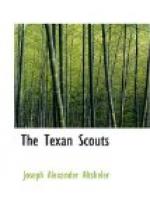* * * * *
A few days before the defenders of the Alamo had begun to scan the southeast for help a body of 300 men were marching toward San Antonio de Bexar. They were clad in buckskin and they were on horseback. Their faces were tanned and bore all the signs of hardship. Near the middle of the column four cannon drawn by oxen rumbled along, and behind them came a heavy wagon loaded with ammunition.
It was raining, and the rain was the raw cold rain of early spring in the southwest. The men, protecting themselves as well as they could with cloaks and serapes, rarely spoke. The wheels of the cannon cut great ruts in the prairie, and the feet of the horses sank deep in the mud.
Two men and a boy rode near the head of the column. One of these would have attracted attention anywhere by his gigantic size. He was dressed completely in buckskin, save for the raccoon skin cap that crowned his thick black hair. The rider on his right hand was long and thin with the calm countenance of a philosopher, and the one on his left was an eager and impatient boy.
“I wish this rain would stop,” said the Panther, his ensanguined eye expressing impatience and anger. “I don’t mind gettin’ cold an’ I don’t mind gettin’ wet, but there is nothin’ stickier or harder to plough through than the Texas mud. An’ every minute counts. Them boys in that Alamo can’t fight off thousands of Mexicans forever. Look at them steers! Did you ever see anything go as slow as they do?”
“I’d like to see Ned again,” said Will Allen. “I’d be willing to take my chance with him there.”
“That boy of ours is surely with Crockett and Bowie and Travis and the others, helping to fight off Santa Anna and his horde,” said Obed White. “Bonham couldn’t have made any mistake about him. If we had seen Bonham himself we could have gone with him to the Alamo.”
“But he gave Ned’s name to Colonel Fannin,” said Will, “and so it’s sure to be he.”
“Our comrade is certainly there,” said Obed White, “and we’ve got to help rescue him as well as help rescue the others. It’s hard not to hurry on by ourselves, but we can be of most help by trying to push on this force, although it seems as if everything had conspired against us.”
“It shorely looks as if things was tryin’ to keep us back,” exclaimed the Panther angrily. “We’ve had such a hard time gettin’ these men together, an’ look at this rain an’ this mud! We ought to be at Bexar right now, a-roarin’, an’ a-t’arin’, an’ a-rippin’, an’ a-chawin’ among them Mexicans!”
“Patience! Patience!” said Obed White soothingly. “Sometimes the more haste the oftener you trip.”
“Patience on our part ain’t much good to men sixty or eighty miles away, who need us yelling’ an’ shootin’ for them this very minute.”
“I’m bound to own that what you say is so,” said Obed White.
They relapsed into silence. The pace of the column grew slower. The men were compelled to adapt themselves to the cannon and ammunition wagon, which were now almost mired. The face of the Panther grew black as thunder with impatience and anger, but he forced himself into silence.




